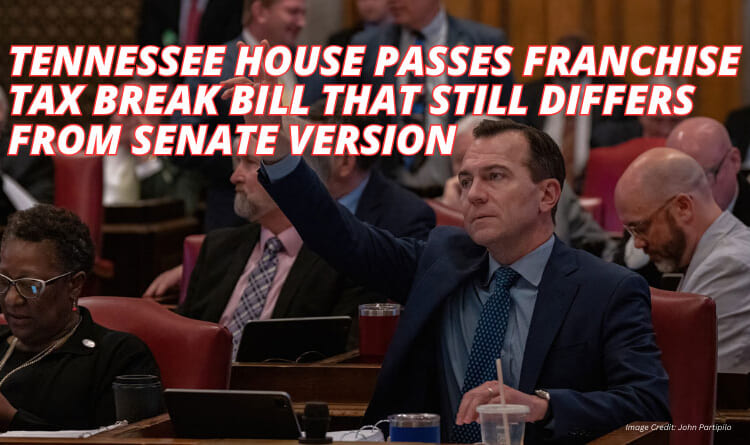The House bill still differs from Senate version and could go to conference committee.
Photo: Rep. John Ray Clemmons, D-Nashville, proposed an alternative tax solution that he said would solve any challenges to the state’s franchise tax by offering tax credits, without a “significant” cost. Photo Credit: John Partipilo
By Sam Stockard [Tennessee Lookout – CC BY-NC-ND 4.0] –
The Tennessee House passed a franchise tax reduction that amounts to $700 million in rebates and $400 million annually for the next few years, even though critics said it is unnecessary.
The measure sponsored by House Majority Leader William Lamberth, which is widely different from the Senate version, passed on a 68-20 vote, with the Republican supermajority deciding the outcome.
It provides rebates for only one year and contains a requirement that companies requesting refunds be listed on the state website along with the amount they receive.
The Senate’s version, which has passed that chamber, would cost about $1.5 billion in refunds stretching back three to four years, in addition to $400 million annually.
Both bills would drop the property value factor from the state’s franchise and excise tax. Senate leaders said they could get on board with the transparency aspect of the House bill. But Senate and House leaders haven’t reached an agreement on the rebates, which could force it into a conference committee to work out differences, which would have to be voted on by each chamber again.
Lamberth, who carried the bill for Gov. Bill Lee’s administration, contended the matter amounted to a “policy decision” that would enable businesses to invest more in their employees and would maintain the state’s “business-friendly” atmosphere.
He noted it could be the largest business tax cut lawmakers ever pass.
Democratic Rep. Justin J. Pearson of Memphis, however, referred to the bill as more “trickle-down” economics that won’t help average state taxpayers.
“We’re just doing this because we think we have the money to spend,” Pearson said. He argued the funds should be redirected to feed children and house people.
The House turned down an effort by Rep. John Ray Clemmons, D-Nashville, to pass an alternative that he claimed would solve any challenges to the state’s franchise tax by offering tax credits, without a “significant” cost. He contended that Lamberth’s bill will give rebates to businesses “out of the goodness of our heart.”
Democrats such as Rep. Aftyn Behn, D-Nashville, lost efforts earlier this session to end the state’s grocery sales tax by shifting the burden to companies that dodge corporate taxes by sheltering their money in offshore accounts.
When Rep. Antonio Parkinson, D-Memphis, tried to make the point that Democrats endorse tax cuts, Lamberth said, “If you want to cut taxes, here’s your chance.”
The Lee administration proposed the tax rebate and reduction, saying the state could face “legal risks” after 80 companies challenged the property value factor in the franchise tax, which also contains a factor for net worth. The department revenue declined to release the names of the companies, none of which have not filed a lawsuit.
Republican Rep. Chris Todd of Madison County argued that businesses always pass taxes down to the “user,” thus the reduction would be a tax break “on real people.”
Todd, however, disagreed with disclosing the names of companies that seek the rebates. But Lamberth said such a move is necessary in this case because of the “extraordinary amount of relief.”

About the Author: Sam Stockard is a veteran Tennessee reporter and editor, having written for the Daily News Journal in Murfreesboro, where he served as lead editor when the paper won an award for being the state’s best Sunday newspaper two years in a row. He has led the Capitol Hill bureau for The Daily Memphian. His awards include Best Single Editorial from the Tennessee Press Association. Follow Stockard on Twitter @StockardSam












